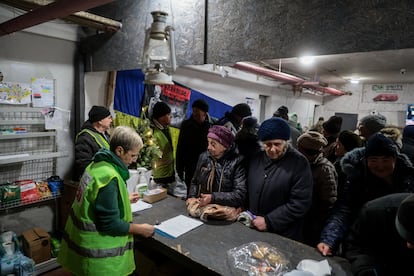Two million Ukrainian civil servants face salary cut-off if Western aid dries up
An analysis by Kyiv sent to its allies, to which EL PAÍS has had access, states that without the promised funds a further million people will be left without social assistance


Ukraine needs the economic lifeline of its Western allies. Without a fresh injection of funds to keep the machinery of state running, Kyiv — which has been at war with Russia for almost 700 days and which devotes a large part of its budget to defense — will be forced to leave up to two million public employees with unpaid salaries and a further million without social benefits in the first quarter of 2024. These are the conclusions of an analysis of the country’s financial situation sent by the government of Volodymyr Zelenskiy to the United States, the European Union and other Western allies, and to which EL PAÍS has had access. Ukraine has urged Washington and Brussels to move forward with aid packages totaling some €100 billion ($110 billion), which remain frozen and pending approval due to political friction in the U.S. Congress and the European Parliament.
The EU is already considering alternative formulas to ensure the economic support promised to Kyiv, in case efforts to persuade Hungarian President Viktor Orbán to lift his veto on the €50 billion ($55.7 billion) package are unsuccessful. That decision must be taken at the European summit on February 1.
In its analysis, Ukraine elaborates on the sensitive disbursements that depend on Western support. The document stresses that — taking into account the available resources and the performance of “priority expenditures” for the defense and security sector, as well as the repayment of state debt — there is “a risk of default of expenditures” on the payment of salaries for more than 1.4 million employees of scientific and educational institutions, as well as for more than 50,000 people working in budgetary and state institutions. Maternity leave payments for around 700,000 people and another 160,000 people receiving low-income social benefits are also at risk of going unpaid.
Tymofiy Milovanov, president of the Kyiv School of Economics, notes that Ukraine lost almost 30% of its GDP last year, according to data from the International Monetary Fund (IMF), due to the full-scale war with Russia. “The Ukrainian economy is resilient, but it is in a difficult situation. It is very war-oriented,” Milovanov, who served as Minister of Economic Development, Trade and Agriculture from 2019-2020 and advises Zelenskiy’s office, says via phone. Kyiv has a raft of defense-related economic activities and foreign aid packages, coupled with the efforts of the private sector and the work of volunteers, have kept the economy afloat to date.
“European funds are needed to maintain the economy. These would be for the state budget because currently all taxes go to defense efforts against Russian aggression. And that means there is hardly anything left for the rest,” Milovanov points out. Added to this is the prospect of expanded conscription as announced by Zelenskiy, whereby the Ukrainian army could draft up to half a million more recruits. That would also prove another cause of strain on the state coffers. “If there is no funding there will be an economic crisis, waves of refugees, and defense will be weakened, which will allow the Russians to gain ground,” the Ukrainian economist says. “If they take too long, Ukraine will have to cover the budget deficit as a first step and cut spending even further, which will lead to social unrest and a macroeconomic financial crisis.”

The European Union wants the special four-year €50 billion package for Ukraine (€33 billion in the form of loans and €17 billion in grants) to be part of a broader revision of the multiannual financial framework (the EU’s multi-year budget outline), which also includes funds to deal with migration flows or boost competitiveness. However, despite the various calculations that have been considered, it has not been possible to persuade Orbán, who did lift Hungary’s veto for the EU to open accession talks with Ukraine, to agree to sanction this amount for the time being.
As backup plans, EU member states are considering disbursing the money through bilateral agreements — via the macro-financial aid tool already employed to provide assistance to Kyiv — or through a formula with EU debt similar to the one used during the pandemic to provide support to member states, which would free up some €20 billion ($22 billion), as reported by the Financial Times. This option, warns a senior EU source, is based on loans and would require parliamentary approval from several partners, which could delay the delivery of the funds.
Kyiv is increasingly concerned about further economic support from the EU and the United States — where some $60 billion pledged by President Joe Biden has been blocked by political infighting, mainly on the Republican side — as it faces the economic and social consequences of a protracted war. Russia is exploiting the delay in Western economic support to fuel the theory that the U.S. and EU will eventually tire of supporting Ukraine. “Those funds will not be able to change the course of events,” Kremlin spokesman Dmitry Peskov said Wednesday during a telephone press conference, as quoted by Interfax. “That money is allocated to the detriment of EU economies, which are already going through difficult times.”
In Besele, a village on the Donbas frontline near the Ukrainian fortress town of Avdiivka, where some of the heaviest fighting is taking place, Vitaly and Lena explain how they receive their pension every month through the public postal service, which despite constant shelling manages to reach many villages in the hottest battle zones. Vitaly, 72, receives a pension and an allowance of about 3,500 grivnas (just over $92) for the time he spent as a liquidator in Chernobyl. His wife Lena, 69, says she receives 3,000 grivnas ($79). “We don’t know anything, we are afraid of everything,” laments Vitaly, who fears that he will no longer receive a pension. Luba Mikhailovna, a civil servant, is also worried about the budget cuts. “We are resilient and without the armed forces, Ukraine would not exist, but we also need help for the rearguard that keeps the country running,” she says.
The IMF has described the Ukrainian economy as “resilient” but warned that the invaded country can only withstand a delay of a couple of months in receiving economic aid from its Western allies. “As the war drags on, it puts pressure on Ukraine’s public finances,” IMF director Kristalina Georgieva said in a statement. On December 12, the IMF released a $900 million package for financial assistance. In addition, coinciding with Christmas, Ukraine received some €1.2 billion ($1.34 billion) from the World Bank, Norway, and Switzerland, which could provide a brief respite, as those funds are designed to support the government in social and emergency aid payments, Ukrainian Finance Minister Sergii Marchenko explained in a statement.
“It is not charity,” stresses Jacob Kirkegaard, a researcher at the German Marshall Fund. “For Europe and the U.S., it is a matter of strategic interest that Ukraine wins this war because if it is won by Russia, it will be a direct threat to several EU member states. And, therefore, for everyone.” Kirkegaard remains confident that Kyiv will receive the aid packages, albeit belatedly: “If Ukraine does not receive military and financial support, Russia will win.”
Sign up for our weekly newsletter to get more English-language news coverage from EL PAÍS USA Edition
Tu suscripción se está usando en otro dispositivo
¿Quieres añadir otro usuario a tu suscripción?
Si continúas leyendo en este dispositivo, no se podrá leer en el otro.
FlechaTu suscripción se está usando en otro dispositivo y solo puedes acceder a EL PAÍS desde un dispositivo a la vez.
Si quieres compartir tu cuenta, cambia tu suscripción a la modalidad Premium, así podrás añadir otro usuario. Cada uno accederá con su propia cuenta de email, lo que os permitirá personalizar vuestra experiencia en EL PAÍS.
¿Tienes una suscripción de empresa? Accede aquí para contratar más cuentas.
En el caso de no saber quién está usando tu cuenta, te recomendamos cambiar tu contraseña aquí.
Si decides continuar compartiendo tu cuenta, este mensaje se mostrará en tu dispositivo y en el de la otra persona que está usando tu cuenta de forma indefinida, afectando a tu experiencia de lectura. Puedes consultar aquí los términos y condiciones de la suscripción digital.








































